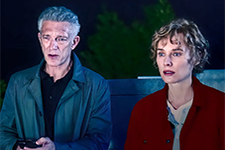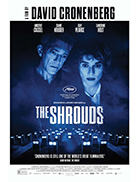The Shrouds
|  David Cronenberg’s The Shrouds is a lumbering slog of a sci-fi psychodrama, weighted down in equal measure by its dull solemnity, emotional frigidity, and fundamental absurdity. Cronenberg’s fifty-year career has long flirted with that fine line between the shocking and the ludicrous, especially in his early body-horror films in which his characters’ physical bodies were merged with or violated by technologies. For the past 25 years he has attempted to steer further and further away from that body-horror legacy, focusing on more straightforward dramas and thrillers, which has resulted in some incredible films, notably Spider (2003), a deeply moving portrait of the fragility of human sanity, and A History of Violence (2005), a treatise on identity disguised as a brutal revenge thriller. The Shrouds has been much anticipated because it marks Cronenberg’s return to the intersection of drama and physical horror, and it offers a few glimpses of what might have been. The fundamental conceit is pure Cronenberg: a new kind of cemetery where sophisticated technology allows the grieving left behind to watch their loved ones’ bodies decompose. This is done via the titular shrouds, which look like conventional burial shrouds, but are actually high-tech devices that give complete visual access through an app that allows you to not just see the rotting body in real time, but rotate it in three-dimensional virtual space and magnify it with 8K clarity. The shrouds are the brainchild of Karsh Relikh (Vincent Cassel), a wealthy businessman who lost his beloved wife, Becca (Diane Kruger), four years earlier. He has since founded a new tech company, GraveTech, and established a special cemetery where each five-foot headstone connects with the coffin beneath to give real-time visual access. He has also, for reasons that are never really explained, added a minimalist-chic fine-dining restaurant right next to his cemetery. The idea itself is fascinating and morbid and compelling—in other words, Cronenberg at his best. Cronenberg has made no bones about the fact that The Shrouds is a deeply personal film for him, as he lost of his wife of 38 years in 2017, and he wanted the film to be a dramatization of how we never stop feeling loss. (Cronenberg has channeled his personal pain into previous films, most notably 1979’s The Brood, which emerged out of the anger and pain of his divorce from his first wife.) Grief is a perpetual thing that is unique to each individual; everyone feels loss in their own way. Given all the exploding heads, viscera, fecal parasites, and bloodletting associated with his earlier films, it is easy to forget that Cronenberg has long been as fascinated by the mind as he has been by the body, and The Shrouds would seem to offer a perfect re-entry into that realm via our emotional inability to let go of the physical remains of our loved ones. But, that is not what The Shrouds does, which is strange because Cronenberg can delve deep into human emotion and rattle us with his insights (The Fly remains not just one of his best films, but one of the best dramatizations of romantic tragedy I have ever seen). Rather, it presents a fascinating idea that could serve as a powerful metaphor, but then gets bogged down in a mystery plot after Karsh’s cemetery is vandalized and is network is hacked. There is no immediate indication of who was behind the damage or what they were trying to accomplish. Was it members of a rival technology company? An angry religious group? Someone with an axe to grind against Karsh or maybe one of the people buried there? Karsh turns to several people for help, notably Terry Gelernt, his late wife’s sister (also played by Kruger) who was a veterinarian, but now works as a dog groomer. Karsh also calls on Terry’s ex-husband, Maury (Guy Pearce), a paranoid tech guru who might be able to help him figure out who is after him and how to get his cemetery back online. Always present is Hunny, Karsh’s virtual reality assistant who takes the form of a chipper, pretty female avatar who looks like she escaped from an early 2000s edition of The Sims. Karsh is also distracted by Soo-Min (Sandrine Holt), the blind wife of a wealthy investor who wants to be buried in his cemetery and is interested in funding another one in Budapest. And Karsh regularly engages with Becca via memories/fantasies of her before she died, when her body was being ravaged by cancer and parts of it (her left breast and arm in particular) have been cut away by surgeons. As the previous paragraph suggests, there is a lot going on in The Shrouds, and that is one of its biggest problems. There is so much happening, and yet none of it feels substantial or emotionally engaging. There is some degree of intrigue involving the mystery of the cemetery vandalism, but it becomes apparent long before the abrupt, seemingly arbitrary ending that Cronenberg isn’t really interested in solving it. He wants to throw a lot at us about Russian and Chinese hackers, paranoia over surveillance, and our willingness to give ourselves over to technology, but too much of it feels either silly (Hunny, the visually outdated AI avatar) or opportunistic (at several points you might feel like you have stumbled into a Tesla commercial). Cronenberg’s writing is soft, and his dialogue is sometimes ludicrously bad (to wit, at one point a character says, “No way!,” to which another character responds, completely unironically, “Way!”). While these are serious issues, the biggest problem with the film are the performances, particularly Vincent Cassel’s. Cassel, who is a fine actor in the right roles, is terribly miscast here; he is never remotely convincing as a man so consumed with grief that he seeks to avoid drowning in it by watching his beloved wife’s body decompose. Cronenberg directs him in such a way that he feels remote and cold (it is also distracting that Cassel has clearly been style to look like Cronenberg with his immense gray pompadour). Cassel is rarely given any opportunity to act human, flawed, distressed, or grieved. Instead, he remains stolid and taciturn, which makes it hard to feel for him. His one moment of emotional outpouring is wasted in the very first shot that turns it into a visual joke by morphing his anguished howl into a visit to the dentist. Kruger is much better as Becca—the abject pain she evinces is palpable—but Terry is such a badly written character that she can’t do much with her. The same goes for Guy Pearce’s performance as Maury, who comes apart at the seams in a way that we wish Karsh would. For a film that is supposed to be about the trauma of loss and grief from someone who knows tragedy inside and out, it just leaves you cold. Copyright © 2025 James Kendrick Thoughts? E-mail James Kendrick All images copyright © Sideshow |
Overall Rating: 
 (2)
(2)


